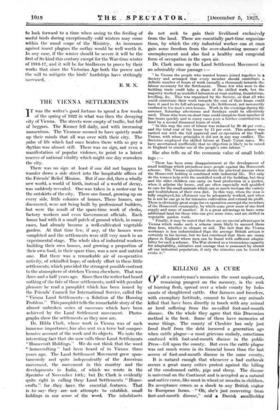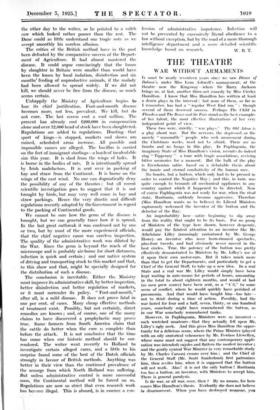KILLING AS A CURE - O F all a countryman's memories
the most unpleasant, remaining pungent on the memory, is the reek of burning flesh, spread over a whole county by holo- causts of slaughtered cattle. Our farmers- and breeders, with exemplary fortitude, consent to have any animals killed that have been directly in touch with any animal or herd suffering from the so=called foot-and-mouth disease. On the whole they agree that this Draconian method is the best. Some of them have -memories of -worse things. The county of Cheshire has only just freed itself from the debt incurred - a generation ago when cattle plaguea most. grievous malady, sometimes confused with foot-and-mouth disease in the public -Press—fell upon the county. But even the cattle plague was not much worse in. its financial losses than the last access of foot-and-mouth - disease in the .same county. . It is natural enough- that :whenever a bad- outbreak occurs a -great many critics protest against. the killing of the condemned: cattle; pigs and: sheep. The disease is universal on the Continent and accepted as a natural and native curse, like smut-in wheator measles in children. Its, acceptance comes'; as a shock to:any British;Arigitor to-European, farms.— Oh, she's just creeovering foot-and-mouth disease," said a Danish smallholder the other day to the writer, as he pointed. to a mulch cow which looked rather poorer than the rest. The Dane could as little understand our tragic note as we accept smoothly his careless allusion; - The critics of the British method have in the past been defeated by the comparative success of the Depart- ment of Agriculture. It had almost mastered the disease. It could argue convincingly that the losses by slaughter in Britain were smaller than would have been the losses by local isolation, disinfection and six months' feeding of unproductive animals, if the malady had been allowed to spread widely. If we did not kill, we should never be free from the disease, so much seems certain.
Unhappily the Ministry of Agriculture begins to lose. its chief justification. Poot-and-mouth disease becomes more, not less, prevalent. We kill, but do not cure. The last access cost a cool million. The present has already cost £200,000 in compensation alone and over 12,000 head of stock have been slaughtered. Regulations are added to regulations. Hunting—that sport of kings—is stopped, markets and shows are ruined, scheduled areas increase. All possible and impossible causes are alleged. The bacillus is carried on the feet of immigrant starlings—a horde of incalculable size this year. It is shed from the wings of larks. It is borne in the bodies of rats. It is intentionally spread by. Irish malefactors. It is sent over in packing the hay and straw from the Continent. It is borne on the wings- of the east wind. No one can dogmatically deny the possibility of any of the theories ; but all recent scientific investigation goes to suggest that it is not. brought by birds, but may very well come in hay and straw packings. Hence the very drastic and difficult regulations recently adopted by the Government in regard to the packing of Continental goods.
We cannot be sure how the germ of the disease is brought, but we can generally trace how it is spread. Iii the lait great outbreak it was confessed not by one or two, but by most of the more experienced officials, that the .chief negative cause was careless inspection. The quality of the administrative work was diluted by the War. Since the germ is beyond the reach of the Microscope and is probably air-borne for short distances, infection is quick and certain ; and our native system of driving and transporting stock to this market and that, to this show and that, might be specially designed for the distribution of such a disease.
The conclusion is inevitable. Either the Ministry must improve its administrative skill, by better inspection, 'better disinfection -and better regulation of Markets, or it must surrender its policy. " Foot-and-mouth," after all, is a mild disease. It does not prove fatal in one per cent. of cases. Many cheap effective methods of treatment exist. Possibly, but not certainly, direct remedies are known ; and, of course, one of the many claims -to have discovered a prophylactic may prove true. Some - farmers from -South America claim that the cattle . do better when the cure is complete than before the attack. It is not conclusive that the time has come when our historic method should be sur- rendered. The writer went recently to Holland to investigate- certain alleged cures, and a little to his surprise found some of the best of the Dutch.. officials strongly in favour of British methods. • Anything was better in their view than the continued prevalence of the scourge from which North Holland was suffering. Bid unless administrative control is more successful .soon, the Continental method will be forced' on us. Regulations are now so strict that even research work has become illegal. This is absurd, is in essence a con- fession of administrative impotence. Infection will not be. prevented by excessively literal obedience to .a law without exception, but by the road of a more thorough intelligence department and a more detailed scientific knowledge based on research. W: B. T.



































































 Previous page
Previous page